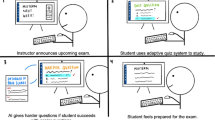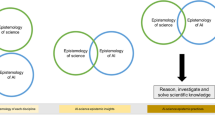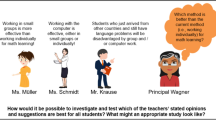Abstract
Analyzing learners’ learning behaviors helps teachers understand how learning behaviors of learners influence learning performance. To determine which learning behaviors influence learners’ science-based inquiry learning performance, this work develops an xAPI (Experience Application Programming Interface)-based learning record store module embedded in a Collaborative Web-based Inquiry Science Environment (CWISE) to record detailed data about students’ learning processes. This work discusses whether the significant correlation and cause-effect relationship among science inquiry competence, learning time, and learning performance exist, and examines whether remarkable shifts and differences in the learning behaviors of learners with different learning performances and inquiry competences exist by using sequential pattern mining and lag sequential analysis. The results demonstrate that inquire ability, total learning time in the designed inquiry learning course, and learning time in an inquiry buoyancy simulation experiment are positively correlated with learning performance and can predict learning performance, and the learning time in the inquiry buoyancy simulation experiment appears to be the most significant predictor. The results of lag sequential analyses indicate that learners with high learning performance and high inquiry competence re-adjust hypotheses after performing an inquiry buoyancy simulation experiment, while learners with low learning performance and low inquiry competence lack this critical inquiry learning behavior. This study presents a systematic analysis method to insight the effective learning behaviors in a web-based inquiry learning environment based on mining students’ learning processes, thus providing potential benefits in guiding learners to adjust their learning behaviors and strategies.





Similar content being viewed by others
References
Abdi, A. (2014). The effect of inquiry-based learning method on students’ academic achievement in science course. Universal Journal of Educational Research, 2(1), 37–41.
ADL Net. (2015). xAPI-Dashboard. Retrieved December 8, 2018, from https://github.com/adlnet/xAPI-Dashboard
Agrawal, R., & Srikant, R. (1995). Mining sequential patterns. In: Proceedings of the Eleventh International Conference on Data Engineering (pp. 3–14), Washington, DC, USA: IEEE Computer Society.
Arnold, J. C., Boone, W. J., Kremer, K., & Mayer, J. (2018). Assessment of competencies in scientific inquiry through the application of Rasch measurement techniques. Education in Science, 8(4), 184–204.
Arroyo, I., & Woolf, B. P. (2005). Inferring learning and attitudes from a Bayesian network of log file data. Proceedings of the 12th international conference on artificial intelligence in education, 33–40.
Backus, L. (2005). A year without procedures. The Science Teacher, 72(7), 54–58.
Bakeman, R. (1986). Observing interaction: an introduction to sequential analysis. New York: Cambridge University Press.
Bakeman, R., Deckner, D. F., & Quera, V. (2005). Analysis of behavioral streams. In D. M. Teti (Ed.), Handbook of research methods in developmental science (pp. 394–420). Oxford: Blackwell Publishers.
Bruner, J. (1990). Acts of meaning. Cambridge: Harvard University Press.
Buffler, A., Allie, S., & Lubben, F. (2001). The development of first year physics students’ ideas about measurement in terms of point and set paradigms. International Journal of Science Education, 23(11), 1137–1156.
Chen, C. M., Chen, L. C., & Horng, W. J. (2019). A collaborative reading annotation system with formative assessment and feedback mechanisms to promote digital reading performance. Interactive Learning Environments, 1–18 https://doi.org/10.1080/10494820.2019.1636091.
Chen, C. M., & Chen, M. C. (2009). Mobile formative assessment tool based on data mining techniques for supporting web-based learning. Computers & Education, 52(1), 256–273.
Chen, C. M., & Lin, S. T. (2014). Assessing effects of information architecture of digital libraries on supporting e-learning: a case study on the digital library of nature & culture. Computers & Education, 75(1), 92–102.
Chen, C. T., & She, H. C. (2014). The effectiveness of scientific inquiry with/without integration of scientific reasoning. International Journal of Science and Mathematics Education, 13(1), 1–20.
Chiang, T. H. C., Yang, S. J. H., & Hwang, G. J. (2014). Students’ online interactive patterns in augmented reality-based inquiry activities. Computers & Education, 78, 97–108.
Corlu, M. A., & Corlu, M. S. (2012). Scientific inquiry based professional development models in teacher education. Educational Sciences: Theory & Practice, 12(1), 514–521.
Cropley, A. J., & Page, K. (2002). Creativity in education and learning- a guide for teachers and educators. Long Range Planning, 35, 199–200.
Deters, K. M. (2005). Student opinions regarding inquiry-based labs. Journal of Chemical Education, 82(8), 1178–1180.
Edelson, D. C., Gordin, D. N., & Pea, R. D. (1999). Addressing the challenges of inquiry-based learning through technology and curriculum design. The Journal of the Learning Sciences, 8(3&4), 391–450.
Fang, S. C., Hsu, Y. S., Chang, H. Y., Chang, W. H., Wu, H. K., & Chen, C. M. (2016). Investigating the effects of structured and guided inquiry on students’ development of conceptual knowledge and inquiry abilities: a case study in Taiwan. International Journal of Science Education, 38(2), 945–1971.
Fortenbacher, A., Beuster, L., Elkina, M., Kappe, L., Merceron, A., Pursian, A., & Wenzlaff, B. (2013). LeMo: a learning analytics application focussing on user path analysis and interactive visualization. In: IEEE 7th International Conference on Intelligent Data Acquisition and Advanced Computing Systems (IDAACS), 2, 748–753.
Fournier-Viger, P., Nkambou, R., & Nguifo, E. M. (2008). A knowledge discovery framework for learning task models from user interactions in intelligent tutoring systems. In: Proceedings of the 7th Mexican International Conference on Artificial Intelligence: Advances in Artificial Intelligence, MICAI '08, pages 765–778, Berlin, Heidelberg, Springer-Verlag.
Fournier-Viger, P., Nkambou, R., Nguifo, E. M., & Faghihi, U. (2009). Building agents that learn by observing other agents performing a task: a sequential pattern mining approach. In B. C. Chien & T. P. Hong (Eds.), Opportunities and challenges for next-generation applied intelligence. Studies in computational intelligence, 214. Berlin, Heidelberg: Springer.
Fournier-Viger, P., Gomariz, A., Gueniche, T., Soltani, A., Wu, C. W., & Tseng, V. S. (2014). SPMF: a Java open-source pattern mining library. Journal of Machine Learning Research, Res, 15, 3389–3393.
Gobert, J. D., Pedro, M. S., Raziuddin, J., & Baker, R. S. (2013). From log files to assessment metrics: measuring students’ science inquiry skills using educational data mining. The Journal of the Learning Sciences, 22(4), 521–563.
Hakverdi-Can, M., & Sönmez, D. (2012). Learning how to design a technology supported inquiry-based learning environment. Science Education International, 23(4), 338–352.
Iacobucci, D., Posavac, S., Kardes, F. R., Schneider, M. J., & Popovich, D. L. (2015). The median split: robust, refined, and revived. Journal of Consumer Psychology, 25(4), 690–704.
Kamber, M., Han, J., & Pei, J. (2012). Data mining: concepts and techniques (3rd ed.). Boston: Morgan Kaufmann.
Khalaf, B. K., & Zin, Z. B. M. (2018). Traditional and inquiry-based learning pedagogy: a systematic critical review. International Journal of Instruction, 11(4), 545–564.
Khan, M., Shaukat, H., Riasat, A., Majoka, M. I., & Ramzan, M. (2011). Effect of inquiry method on achievement of students in chemistry at secondary level. International Journal of Academic Research, 3(1), 955–959.
Kim, M. C., Hannafin, M. J., & Bryan, L. A. (2007). Technology-enhanced inquiry tools in science education: an emerging pedagogical framework for classroom practice. Science Education, 91(6), 1010–1030.
Klahr, D., & Dunbar, K. (1988). Dual space search during scientific reasoning. Cognitive Science, 12(1), 1–48.
Li, B., Kuo, R., Chang, M., & Garn, K. (2015). Reward points calculation based on sequential pattern analysis in an educational mobile app. In: Proceedings of 21st International Conference on Distributed Multimedia Systems (pp. 186-190), Vancouver, Canada.
Lim, K. C. (2015). Case studies of xAPI applications to e-learning. The twelfth international conference on eLearning for knowledge-based society, 3.1–3.12.
Linn, M. C., & Eylon, B. S. (2011). Science learning and instruction: taking advantage of technology to promote knowledge integration. New York: Routledge.
Manso-Vázquez, M., Caeiro-Rodríguez, M., & Llamas-Nistal, M. (2015). xAPI-SRL: Uses of an application profile for self-regulated learning based on the analysis of learning strategies. In: Proceedings of the 2015 IEEE Frontiers in education conference. IEEE Computer Society, Washington, DC, 1–8.
Marono, A., Clarke, D., Navarro, J., & Keatley, D. (2018). A sequence analysis of nonverbal behaviour and deception. Journal of Police and Criminal Psychology, 33(2), 109–117.
Marx, R. W., Blumenfeld, P. C., Krajcik, J. S., Fishman, B., Soloway, E., Geier, R., & Tal, R. T. (2004). Inquiry-based science in the middle grades: assessment of learning in urban systemic reform. Journal of Research in Science Teaching, 41(10), 1063–1080.
Moran, G., Dumas, J. E., & Symons, D. K. (1992). Approaches to sequential analysis and the description of contingency in behavioral interaction. Behavioral Assessment, 14, 65–92.
Myers, M. J., & Burgess, A. B. (2003). Inquiry-based laboratory course improves students’ ability to design experiments and interpret data. Advances in Physiology Education, 27(1–4), 26–33.
National Research Council. (2000). Inquiry and the National Science Education Standards: a guide for teaching and learning. Washington, DC: National Research Council.
National Research Council. (2012). A framework for K-12 science education: practices, crosscutting concepts, and core ideas. Washington, DC: National Academies Press.
Pan, W., & Hawryszkiewycz, I. (2004). A method of defining learning processes. In R. Atkinson, C. McBeath, D. Jonas-Dwyer, & R. Phillips (Eds.), Beyond the comfort zone: Proceedings of the 21st ASC1LnE Conference (pp. 734–742). Perth: 5-8 December.
Piaget, J. (2013). Principles of genetic epistemology: Selected works (Vol. 7). Routledge.
Quera, V., & Bakeman, R. (2000). Quantification strategies in behavioral observation research. In T. Thompson, D. Felce, & F. J. Symons (Eds.), Behavioral observation (1st ed., pp. 297–315).
Rabelo, T., Lama, M., Amorim, R. R., & Juan C. Vidal, J. C. (2015). SmartLAK: A big data architecture for supporting learning analytics services. Proceedings of 2015 Frontiers in education conference (FIE); El Paso, Texas, pp. 1–5.
Raes, A., & Schellens, T. (2015). Unraveling the motivational effects and challenges of web-based collaborative inquiry learning across different groups of learners. Educational Technology Research and Development, 63(3), 405–430.
Rutten, N., van Joolingen, W. R., & van der Veen, J. T. (2012). The learning effects of computer simulations in science education. Computers & Education, 58(1), 136–153.
Sparapani, E. F., Abel, F. J., Easton, S. E., Edwards, P., & Herbster, D. L. (1996). Portfolio assessment: a way to authentically monitor progress and evaluate teacher preparation. In: Annual Meeting of the Association of Teacher Educators’ 76th Annual Meeting (pp. 1–20), St. Louis, Missouri.
SPMF. (2015). Documentation SPMF. Retrieved October 19, 2018, from http://www.philippe-fournier-viger.com/spmf/index.php?link=documentation.php#example13.
Spronken-Smith, R. (2012). Experiencing the process of knowledge creation: the nature and use of inquiry-based learning in higher education. The Journal of Geography in Higher Education, 2, 183–201.
Taylor, J., & Bilbrey, J. (2012). Effectiveness of inquiry based and teacher directed instruction in an Alabama elementary school. Journal of Instructional Pedagogies, 8, 17.
Tin Can API. (2015). What is the Tin Can API? Retrieved October 17, 2018, from https://tincanapi.com/overview/
Watkins, J. (2016). Effects of self-monitoring during inquiry based learning on the behavior and academic performance of at-risk middle school students. (Electronic Thesis or Dissertation). Retrieved from https://etd.ohiolink.edu/
Williams, P., Wray, J., Farrall, H., & Aspland, J. (2014). Fit for purpose: traditional assessment is failing undergraduates with learning difficulties. Might eAssessment help? International Journal of Inclusive Education, 18(6), 614–625.
Wu, H. K., & Hsieh, C. E. (2006). Developing sixth graders’ inquiry skills to construct explanations in inquiry-based learning environments. International Journal of Science Education, 28(11), 1289–1313.
Wu, J. W., Tseng, J. C. R., & Hwang, G. J. (2015). Development of an inquiry-based learning support system based on an intelligent knowledge exploration approach. Educational Technology & Society, 18(3), 282–300.
Yang, T. C., Chen, Y., & Hwang, G. J. (2015). The influences of a two-tier test strategy on student learning: a lag sequential analysis approach. Computers & Education, 82, 366–377.
Author information
Authors and Affiliations
Corresponding author
Ethics declarations
To consider the research ethics of the designed experiment that involves recording the learning behaviors of the research subjects by using xAPI technologies, written informed consent was obtained from the research subjects following a full explanation of the experiment. The informed consent letter contains the specific nature of the research, including the data that collect from them, are only for the research, their name will never appear on any data collected and that instead, we will provide a unique identification number on their data and that this information will remain secure such that only the principal investigator of this study will have access to it, the collected data that is no longer needed will be destroyed, and how participation will make a contribution to our study’s goals. Moreover, all procedures performed in this study involving human participants were by the ethical standards of the institutional and/or national research committee and with the 1964 Helsinki declaration and its later amendments or comparable ethical standards. Finally, we certify that there is no conflict of interest in this paper.
Additional information
Publisher’s Note
Springer Nature remains neutral with regard to jurisdictional claims in published maps and institutional affiliations.
Rights and permissions
About this article
Cite this article
Chen, CM., Wang, WF. Mining Effective Learning Behaviors in a Web-Based Inquiry Science Environment. J Sci Educ Technol 29, 519–535 (2020). https://doi.org/10.1007/s10956-020-09833-9
Published:
Issue Date:
DOI: https://doi.org/10.1007/s10956-020-09833-9




